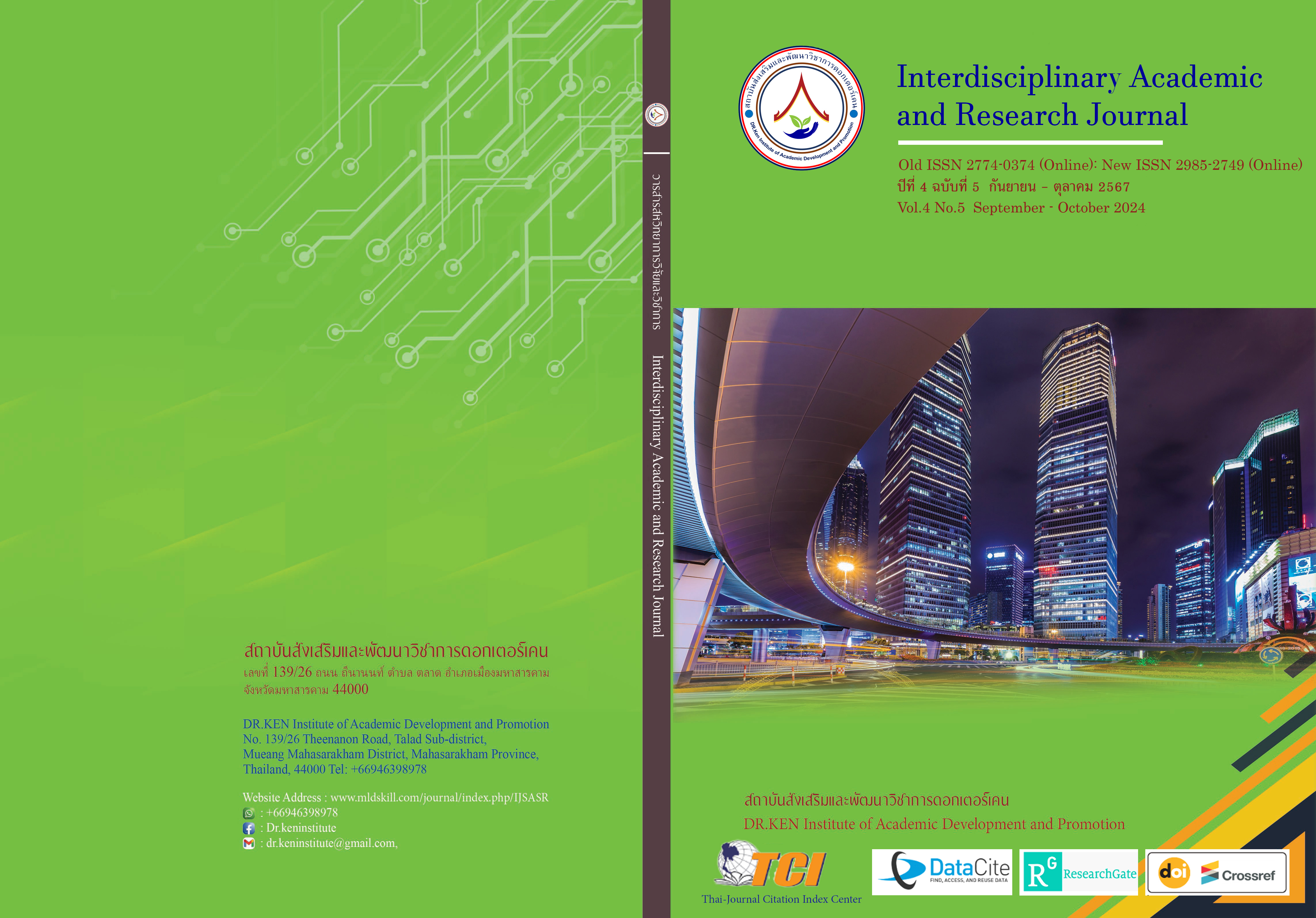The Results of Storytelling Activities with Yoga to Promote Working Memory Skills in Early Childhood Children
DOI:
https://doi.org/10.60027/iarj.2024.277795Keywords:
Storytelling Activities with Yoga; , Working Memory Skills; , Early Childhood ChildrenAbstract
Background and Aims: Working memory is a crucial executive function and plays a fundamental role in our ability to learn, reason, and solve problems. Children’s working memory skills develop as they grow. There are various strategies to strengthen working memory for children. The objectives of this study were to 1) study the results of storytelling activities with yoga to promote the working memory skills of early childhood children and 2) compare the working memory skills of early childhood children before and after using storytelling activities with yoga to promote the working memory skills of early childhood children.
Methodology: The sample group used in the study were 30 male and female early childhood children between the ages of 5-6 years who were studying in kindergarten 2, semester 2, academic year 2023, Nong Chok Pittayanusorn School, Bangkok, by cluster random sampling. The tools used in the study were storytelling activities with yoga to promote the working memory skills of early childhood children and the memory skills assessment form. Data were analyzed using mean, standard deviation, percentage, and t-test (dependent sample).
Results: The results of the study revealed that before the experiment, most early childhood children had working memory skills at a very low level, calculated as 50.00 percent, followed by a low level, calculated as 26.67 percent, good level calculated as 20.00 percent and moderate level calculated as 3.33 percent. After the experiment, most early childhood children had working memory skills at a moderate level, calculated as 40.00 percent, followed by a very good level calculated as 30.00 percent, a good level calculated as 26.67 percent, and a low level calculated as 3.33 percent. Scores of working memory skills of early childhood children before using storytelling activities with yoga had a mean of 4.63, a standard deviation of 2.04, and after using storytelling activities with yoga had a mean of 8.13 and a standard deviation of 1.76. When comparing the differences in memory skill scores for early childhood children, it was found that the working memory skills scores after the use of storytelling activities with yoga to promote working memory skills of early childhood children were significantly higher at the .05 level.
Conclusion: Early childhood children have higher working memory skills after using storytelling activities with yoga to promote working memory skills in early childhood children.
References
กระทรวงศึกษาธิการ. (2561). คู่มือหลักสูตรการศึกษาปฐมวัยพุทธศักราช 2560 สำหรับเด็กอายุ 3-6 ปี. กรุงเทพฯ : โรงพิมพ์ชุมนุมสหกรณ์การเกษตรแห่งประเทศไทย.
จริยาภรณ์ วิริยะรัตนพร. (2564). กิจกรรมโยคะเพื่อพัฒนาการบริหารจัดการของทักษะสมอง EF สำหรับเด็กปฐมวัย. วารสารมหาวิทยาลัยราชภัฏธนบุรี, 15(1), 213-224.
จิระพร ชะโน. (2562). การศึกษาพัฒนาการด้านการคิดเชิงบริหารของเด็กปฐมวัย. วารสารศึกษาศาสตร์ มหาวิทยาลัยมขอนแก่น, 42(3), 111-118.
จุฑาธิป เกิดช้าง. (2561). ผลของกิจกรรมโยคะที่มีต่อพฤติกรรมวินัยในตนเองของเด็กปฐมวัย. วิทยานิพนธ์ปริญญามหาบัณฑิต: มหาวิทยาลัยราชภัฎพระนคร.
นวลจันทร์ จุฑาภักดีกุล. (2560). ทักษะการคิดเชิงบริหาร (Executive Functions- EF) กับความพร้อมทางการเรียนในเด็กปฐมวัย การสัมมนาเรื่อง “การพัฒนาศักยภาพการพยาบาลเฉพาะทาง สาขาการพยาบาลสุขภาพจิตและจิตเวชเด็กและวัยรุ่น” 21 มิถุนายน 2560 กรุงเทพฯ : เซ็นทรา บายเซ็นทาราศูนย์ราชการ ประเทศไทย.
นวลจันทร์ จุฑาภักดีกุล. (2561). รู้จักทักษะสมอง EF Executive Function Skills. คู่มือพัฒนาทักษะ สมอง EF Executive Functions สำหรับครูปฐมวัย. บริษัทมติชน.
นัตโตะซัง และศักดิ์ชัย ศรีวัฒนาปิติกุล. (2554). คุณหนู YOGA. กรุงเทพฯ : สำนักพิมพ์วงกลม.
บุญชม ศรีสะอาด. (2560). การวิจัยเบื้องต้น (พิมพ์ครั้งที่ 10). กรุงเทพ: สุวีริยาสาส์น
ปนัดดา ธนเศรษฐกร. (2561). การส่งเสริม Executive Function (EF) ทักษะสมองเพื่อชีวิตที่สำเร็จ. [เอกสารถอดความการส่งเสริม EF ทักษะสมองเพื่อชีวิตที่สําเร็จ]. Retrieved on June 27, 2023, from www.scbfoundation.com/stocks/75/file/1537246944rvu1x75pdf/
พิมพ์พันธุ์ ชุมภูชัย. (2562). ผลการจัดกิจกรรมการเล่านิทานประกอบการวาดและพับที่มีต่อความเข้าใจในเรื่องรูปเรขาคณิตของเด็กปฐมวัย โรงเรียนวัดสันกลางเหนือจังหวัดเชียงใหม่. การศึกษาค้นคว้าอิสระปริญญามหาบัณฑิต: มหาวิทยาลัยสุโขทัยธรรมาธิราช.
ลัดดาวัลย์ เพชรโรจนิ์ และอัจฉรา ชำนิประศาสน์. (2547). ระเบียบวิธีวิจัย. กรุงเทพ : พิมพ์ดีการพิมพ์.
วรวิทย์ จันทร์สุวรรณ. (2561). การทดสอบที (t-test) โดยโปรแกรม Excel. 14 สิงหาคม 2561 Retrieved on August 13, 2023, from https://web.rmutp.ac.th/woravith/?page_id=1048
วรสิทธิ์ ศิริพรณิชย์ . (2565). สมองของเด็กและความจำเป็นในการพัฒนาทักษะสมอง EF. Retrieved on June 7, 2023, from https://shorturl.asia/8tPsb
วีรยา คำเรืองฤทธิ์. (2564). การพัฒนาโปรแกรมส่งเสริมการคิดเชิงบริหารสาหรับเด็กปฐมวัยที่มีอาการสมาธิสั้นและซนอยู่ไม่นิ่งโดยการมีส่วนร่วมของผู้ปกครอง. ปริญญานิพนธ์ดุษฎีบัณฑิต. มหาวิทยาลัยศรีนครินทร วิโรฒ . Retrieved on June 27, 2023, from http://ir-ithesis.swu.ac.th/dspace/bitstream/123456789/1511/1/gs601150007.pdf
สถาบันส่งเสริมการสอนวิทยาศาสตร์และเทคโนโลยี. (2566). โมเดลการทำงานของสมองแบบคู่หน่วยความจำ. Retrieved on June 22, 2023, from https://physics.ipst.ac.th/?p=306,
สุภาวดี หาญเมธี, ธิดา พิทักษ์สินสุข, และภาวนา อร่ามฤทธิ์ (บรรณาธิการ). (2562). คู่มือพัฒนาทักษะสมอง EF Executive Function สำหรับครูปฐมวัย (พิมพ์ครั้งที่ 2). กรุงเทพ : บริษัทมติชน.
เอกชัย พรรณเชษฐ์. (2558). ประทีปแห่งโยคะ: คู่มือปฏิบัติด้วยตนเอง. กรุงเทพฯ : โรงพิมพ์ไทยวัฒนาพานิช.
Baddeley, A.D. (2012). Working memory: theories, models, and controversies. Rev Psychol. 6(3): 1-29. Retrieved on August 17, 2023, from: https://pubmed.ncbi.nlm.nih.gov/21961947/
Baddeley, A.D., Hitch, G.J., & Allen, R.J. (2009). Working memory and binding in sentence recall. Journal of Memory and Language, 61(3), 438-456. Retrieved on June 14, 2023, from https://www.sciencedirect.com/science/article/abs/pii/S0749596X09000576
Bastille, J.V. (2004). A yoga-based exercise program for people with chronic post-stroke hemi paresis. Physical Therapy, 84(1), 33–48.
Bendotti, M. (2022). Arhanta yoga. Retrieved on September 23, 2023, from https://www.arhantayoga.org/blog/yoga-poses-for-kids/
Dorer, M. (2021). Storytelling and executive functioning. Retrieved on June 27, 2023, from: https://www.montessori.org/storytelling-and-executive-functioning.
Hargraves, V. (2022). Games and activities for building executive function in 3-5-year-olds. Retrieved on August 17, 2023, from https://theeducationhub.org.nz/games-and-activities-for-building-executive-function-in-3-5-year-olds/
Nelwan, M., Bos, F., Vissers, C. & Kroesbergen, K. (2021).The relation between working memory, number sense, and mathematics throughout primary education in children with and without mathematical difficulties. National Library of Medicine, 28(2), 143-170. https://www.tandfonline.com/doi/full/10.1080/09297049.2021.1959905
Roman, A.S., Pisoni, D.B., & Kronenberger, W.G. (2014). Assessment of working memory capacity in preschool children using the missing scan task. Infant and child development. 23(6), 575–587. Retrieved on June 17, 2023, from https://www.ncbi.nlm.nih.gov/pmc/articles/PMC4310560/
Downloads
Published
How to Cite
Issue
Section
License
Copyright (c) 2024 Interdisciplinary Academic and Research Journal

This work is licensed under a Creative Commons Attribution-NonCommercial-NoDerivatives 4.0 International License.
Copyright on any article in the Interdisciplinary Academic and Research Journal is retained by the author(s) under the under the Creative Commons Attribution-NonCommercial-NoDerivatives 4.0 International License. Permission to use text, content, images, etc. of publication. Any user to read, download, copy, distribute, print, search, or link to the full texts of articles, crawl them for indexing, pass them as data to software, or use them for any other lawful purpose. But do not use it for commercial use or with the intent to benefit any business.
















.png)


